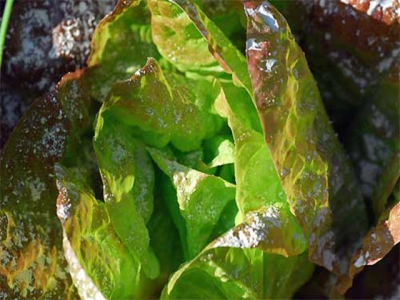Pests and Diseases of Lettuces

Lettuces
Aphids (various species)
Typical symptoms: Leaves are infested with pink or green aphids; the leaves may be sticky.
Prevention and treatment: See Aphids as Garden Pests
Cutworm (Noctua pronuba and other moth larvae)
Typical symptoms: Plants wilt suddenly; stems are eaten through at ground level. Large, fat caterpillars may be found in surrounding soil.
Prevention and treatment: See Pests and Diseases of Seedlings and Young Plants
Grey mould (Botrytis cinerea)
Typical symptoms: Heads of lettuce rot; a fluffy grey mould is present.
Prevention and treatment: See How to Treat Common Plant Diseases
Lettuce downy mildew (Bremia lactucae)
Typical symptoms: Yellow patches appear on leaves; white mould may develop underneath in damp conditions. The patches turn brown and angular with age.
Prevention and treatment: See How to Treat Common Plant Diseases
Lettuce root aphid (Pemphigus bursarius)
Typical symptoms: Plants wilt suddenly; growth may be stunted. Small, pale aphids are seen on the roots surrounded by a white powdery wax.
Prevention and treatment: The most effective way to avoid this pest is to grow resistant varieties. See Aphids as Garden Pests
Slugs and snails
Typical symptoms: Leaves are eaten at night; slime trails are visible.
Prevention and treatment: See Slugs and Snails – Garden Pest Control
Viruses and deficiencies
Typical symptoms: Yellow marbling or other unusual patterns on leaves.
Prevention and treatment: See Plant Diseases – Understanding the Problem
Wireworm (Agriotes lineatus)
Typical symptoms: Seedlings and larger plants grow poorly.
Prevention and treatment: See General Garden Pests
Có thể bạn quan tâm
 How to Treat Common Plant Diseases
How to Treat Common Plant Diseases More usually associated with dead wood, this distinctive disease can cause die-back on currants, gooseberries, apples and many other woody plant
 Expert Advice for Green House Gardening – Making a Hot Bed
Expert Advice for Green House Gardening – Making a Hot Bed Making hot beds is a form of green house gardening but without the green house. Frame beds provided with bottom heat will bring crops to maturity long before
 IPM for cabbage aphids
IPM for cabbage aphids When it comes to cabbage aphids and Integrated Pest Management (IPM), success will depend on the crop being grown, the season and other considerations.